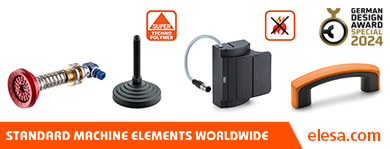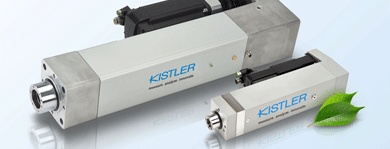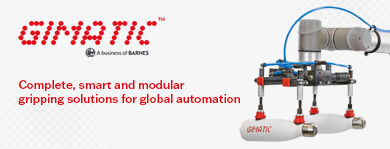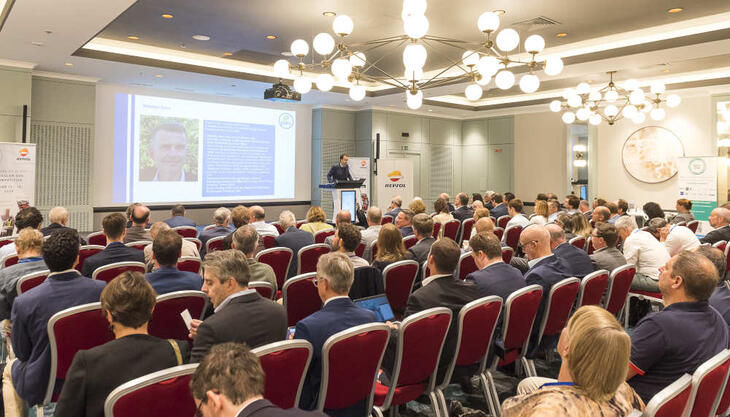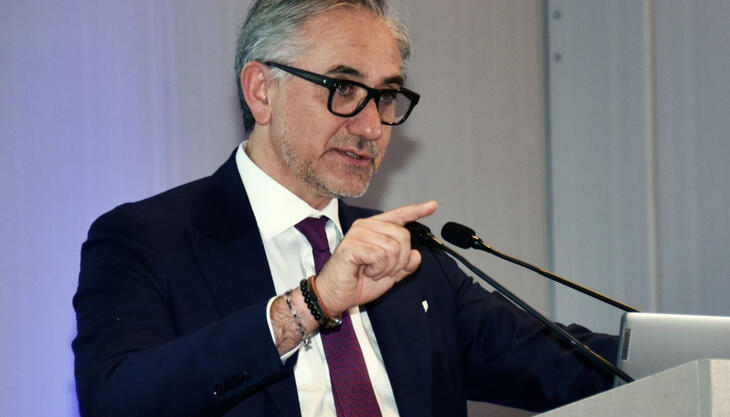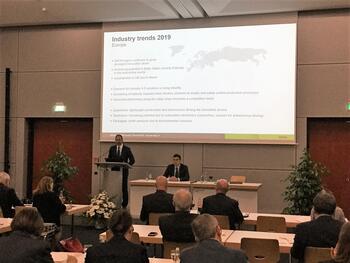
The injection moulding machine manufacturer and system solutions provider, Engel, presented itself in good spirits at Fakuma 2018. It is expected to experience further moderate growth for the current fiscal year, even despite the strong growth of recent years shifting to a sideways movement globally. Asia and German-speaking Europe are the regions that are continuing to evolve in a positive direction. Engel has made further additions to its world-wide workforce during the current fiscal year.
Specifically, at the end of March 2019, Engel is expecting to close out the fiscal year 2018/2019 with a group turnover of around 1.6 billion euros, which would represent a 6% increase over the previous year. In the 2017/2018 fiscal year, the company boosted its turnover world-wide by 11% to 1.51 billion euros. In the latest revenue breakdown, Europe represents the lion’s share with 53%, while America currently amounts to 24% and Asia to 22%. “The revenue growth in Asia is by far the biggest in the ENGEL Group”, reported Christoph Steger, CSO of Engel Holding, at Fakuma 2018. “And Asia is continuing to develop very dynamically”.
On the other hand, the latest developments in North America are not as encouraging. Following several years of strong growth, the region is below last year’s level, as of the end of fiscal year 2018/19’s second quarter. “The trade disputes between the major economic powers are creating uncertainty. They are making it difficult to give forecasts”, Steger said, especially given that they could impinge upon European exports. Many international corporate groups have their headquarters in Europe, and procure machines and manufacturing solutions from there for their locations around the world.
To date, there has been no sign of a downturn in European exports. Alongside Asia, Engel can report further growth in the German-speaking nations of Europe, also known as the DACH countries (“D” for Germany, “A” for Austria and “CH” for Switzerland). “We are currently above where we were one year ago in terms of incoming orders in the DACH region”, Steger explained.
Germany remains key engine of innovation
Germany remains the market with the highest turnover and continues to be the key engine of innovation for Engel. The company has managed to increase its sales in Germany by 50% over the past five years. Two factors in particular are contributing to this. Firstly, the global expansion of many companies based in Germany and secondly, the high level of technological development with heavily demanding projects.
Engel devotes due attention to the vital importance of the German market, maintaining four subsidiaries in Nuremberg, Hagen, Hanover and Stuttgart. The newest of these, the Engel Deutschland Technologieforum Stuttgart, celebrated its fifth anniversary this year. In its first years of its existence, it has already managed to benefit disproportionately from the industry which is growing with a heady dynamism in South West Germany. The state of Baden-Württemberg and, in particular, its Stuttgart region are European leaders in the field of electric mobility. With its own Centre for Lightweight Composite Technologies, Engel is one of the automotive industry’s preferred partners in this field.
The largest of the German branches is Engel Hannover with 100 employees, which also makes it one of the largest company subsidiaries in the world. Across all four locations, Engel currently employs 340 people in Germany.
Europe stable at high level
On the whole, Europe is trending at a stable and high level. Continued growth in Central Europe is balancing out the slowdown in UK, where the still unpredictable consequences of Brexit are producing bouts of uncertainty. In Eastern Europe, the company is tapping new potential in the Baltic States.
Differing developments in the Americas
The slowdown in North America is primarily due to the large international conglomerates, which are taking a wait-and-see approach in the wake of the latest developments in economic policy. “Smaller, local enterprises are still on an investment path”, Steger noted, with the medical and teletronics sectors moving in a particularly positive direction. In the latter area, Engel is benefiting from increased domestic consumer electronics production. In the medical technologies business, the still relatively new field of personal medical devices is motivating investments in new technologies and equipment. Analysts forecast that this market segment will triple in volume over the next five years. “In medical technology, we are reaping the rewards of our very strong commitment in recent years”, Steger stressed. “The establishment of business units in North America has further strengthened our customers’ trust”, he added.
In Mexico, it is the car industry that is a source of optimism for the Austrian manufacturer, even though certain projects have been discontinued of late. The last fiscal year, 2017/18, was the best in Querétaro-based Engel de Mexico’s history. Mexico is home to the first machines supplied by Engel to the Americas for integrated FRP lightweight engineering. Alongside the automotive industry, the electronics and medical technology sectors have made a contribution to company’s excellent progress in Mexico.
After two difficult years, the economic situation eased in Brazil in the 2017/18 fiscal year, which has been reflected in strong incoming orders for São Paulo-based Engel do Brasil in South America’s largest market. In particular, packaging promises great additional potential in the country. There is especially demand for large, all-electric injection moulding machines. South America is inconsistent in its activity overall, with Argentina currently on a downtrend.
Asia: medical and packaging driving growth
Engel can also point to highly successful results in Asia for the newly introduced business unit structure. It can thank enhanced industry expertise locally, particularly in the medical and packaging industries, for new projects arising. Both industries are subject to rising quality requirements, which are leading to increased demand for innovative technologies and demanding production solutions. China is the strongest driver of growth in Asia, while the momentum of recent years has slowed somewhat in South East Asia.
Well-equipped for new requirements with strengthened teams
In addition to its turnover numbers, the company is larger than ever before in its history in terms of its employee count. By the end of the current fiscal year, it will be employing 6,800 people around the globe, around half of which will be in Austria.
Engel is putting the continuing growth in its human resources to good use in response to its customers’ changing requirements. “We are providing increasingly strong support to our customers for the entire service life of their injection moulding machines and system solutions”, reported Stefan Engleder, CEO of Engel Holding. “The trend towards digitalisation and ongoing advances in process integration and automation are increasingly making consulting services a necessity. In addition, networking and connectivity are leading to the creation of new business models, which we can use to provide even better support to processors during their routine production operations”, Engleder added. Aside from sales, the teams have been strengthened worldwide, especially in the service area.
E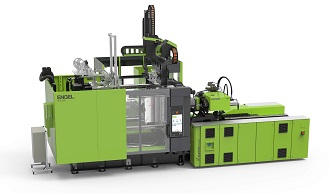 ngel
continuously adapts its structures and processes to the growing needs of its
customers. In an effort to consult with customers in all regions of the world
on an even closer individual basis, it began several years ago to transfer its
highly successful sales structures established in Europe to other regions.
Dedicated automation centres have been established at the overseas plants,
local technology centre capacities have been expanded, and business units have
been established in America and Asia, with additional industry experts posted
all over the world. Engel took the next big step prior to Fakuma, consolidating
its 30 subsidiaries and 60 representative offices into seven sales regions and
appointing regional sales presidents. These presidents will take on
responsibility for sales in their regions with immediate effect, streamlining
decision-making. “We will be able to anticipate future needs even earlier with
the new structure and the strengthened teams. As a result, we can improve
competitiveness for ourselves and, most importantly, for our customers”, Steger
stated.
ngel
continuously adapts its structures and processes to the growing needs of its
customers. In an effort to consult with customers in all regions of the world
on an even closer individual basis, it began several years ago to transfer its
highly successful sales structures established in Europe to other regions.
Dedicated automation centres have been established at the overseas plants,
local technology centre capacities have been expanded, and business units have
been established in America and Asia, with additional industry experts posted
all over the world. Engel took the next big step prior to Fakuma, consolidating
its 30 subsidiaries and 60 representative offices into seven sales regions and
appointing regional sales presidents. These presidents will take on
responsibility for sales in their regions with immediate effect, streamlining
decision-making. “We will be able to anticipate future needs even earlier with
the new structure and the strengthened teams. As a result, we can improve
competitiveness for ourselves and, most importantly, for our customers”, Steger
stated.







